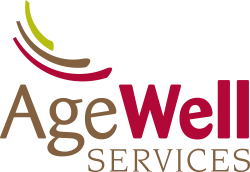A growing number of donations to AgeWell Services of West Michigan and other nonprofit organizations come directly from donors’ investment accounts. Changes in tax laws in recent years have given some donors considerable tax advantages using donor-advised funds and gifts made directly from some investment accounts.
Donor-Advised Funds (DAFs)
In 2021, donors gave $45.7 billion to nonprofit organizations from DAFs, according to the National Philanthropic Trust. AgeWell Services received nearly $64,000 from DAFs in 2022, the first year specifically tracking this form of donating.
Donors use a DAF for several reasons. For some people, DAFs provide immediate tax benefits in a financial windfall year such as an inheritance or a large performance bonus. These funds can be deposited into a DAF with the full amount deducted from taxable income that year. Any investment income also is earned tax free since it will be distributed to the charitable causes specified.
A DAF also allows a donor to establish a charitable giving philosophy and direct grants to specific nonprofits carrying out that philosophy. Many DAF donors to AgeWell Services support Meals on Wheels or the Senior Medical Transportation specifically because these programs match the donors’ goals to help seniors remain living independently for as long as possible. A DAF also allows an individual’s philanthropic efforts to extend beyond their lifetime, creating a legacy of giving as part of their estate plan. Your local community foundation can help set up such accounts, or there are several investment firms that work with DAFs. The Community Foundation for Muskegon County, the Grand Haven Area Community Foundation, the Community Foundation of the Holland/Zeeland Area, and the Community Foundation for Oceana County all will help donors set up a DAF.
Qualified Charitable Distributions (QCDs)
For many people, checks or online charges to their credit card are how they make their gifts. A QCD allows donations to come directly from an individual retirement account (IRA) if the owner is 70½ years or older. The donation both counts toward the minimum required annual distribution and can be deducted from the donor’s annual income, even without itemizing your taxes, according to Investopedia.
There are a few rules about QCDs. The donation must be a federally recognized nonprofit organization. AgeWell Services is one such organization, and we are listed on the IRS’ searchable listing of approved recipients of QCDs.
Unfortunately, 401(k)-type retirement accounts do not qualify for QCDs. Also, the distribution must come directly from the IRA managers. You cannot take the money from the IRA, deposit it into your household accounts and then write a check to the charity of choice.
These two types of charitable funds provide a wealth of tax benefits for philanthropic planning, but they all come with rules and fees. It’s important for donors to learn as much as they can and ask questions before establishing a DAF or using a QCD, but they can help donors maximize their giving options.
For nonprofits like AgeWell Services, the support from our donors is priceless – regardless of the source of the funds!
The information in this post is offered for general information only. Nothing here should be construed as legal or tax advice for anyone’s specific situation. If you are interested in this topic, please consult with your financial planner or seek legal advice for your specific situation.
